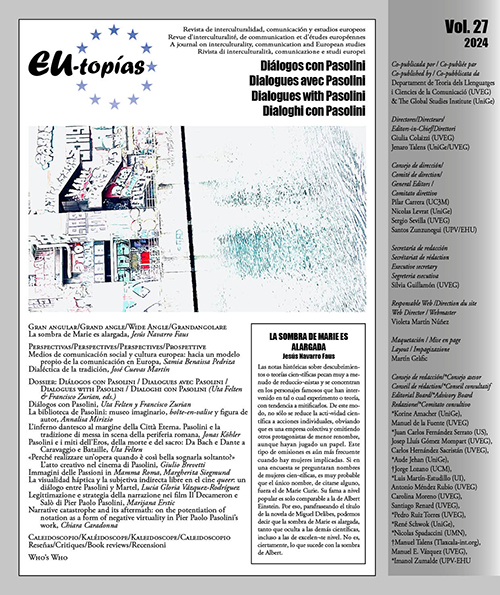Dialectics of Tradition. Political Transition and Democratic Culture
DOI:
https://doi.org/10.7203/eutopias.27.28361Keywords:
Tradition, democratic culture, dialetics, Spanish transition, historic memory, oblivion, mythology, documentary. Abstract
Abstract
The process of creating tradition, understood as a social phenomena towards the construction of a cultural heritage, is viewed in this contribution from the perspective of the study of the development of democratic culture in the historical period which takes the Spanish transition to democracy as a reference point. These considerations are based on a previous investigation and documentation carried out with an oral history methodology by cinematographic means, and consistent with the collection of over hundred testimonies throughout the Spanish geography in the period of 2012-17. These life stories belong to people who actively participated in, or were deeply affected by, the political facts occurring in Spain during the period of 1969 to 1982. Considerations about social-political aspects related to oral history, image, mythology and ideology are fundamental in interpreting these discussions. It can be inferred from this double work, both field and theoretical, that democractic culture and tradition of societies can be described best as a dialectical process shaped by the economic and power interests of the social groups which form that collectivity, a process in which ideological factors associated with memory and oblivion, play a first order role.
 Downloads
Downloads
 References
References
Baer, Alejandro. El testimonio audiovisual. Imagen y memoria del holocausto. Madrid: Siglo XXI. 2014.
Benjamin, Walter. «El narrador». Para una crítica de la violencia y otros ensayos. Iluminaciones IV. Madrid, Taurus. pp: 11-134. 1991.
Boletín Oficial del Estado BOE: 1977, núm. 248:I. pp: 22765-6. Madrid, B.O.E. 1977.
Böll, Heinrich y Schlöndorff, Volker. «Delayed Antigona». Germany in Autumn. The Alexander Kluge Collection. Chicago. Facets Videos, 2004
Cavani, Liliana. I cannibali: the year of the cannibals. Roma. Rarovideo, 2013.
Cuevas, José. «Punto Final: Memorias de la Transición 1969-82». Reel News, Londres. Disponible en web: https://www.reelnews.co.uk/2022/11/05/all-reelnews-campaigns/international/punto-final-version-castellano/
Derrida, Jacques. Espectros de Marx. Madrid. Trotta, 1995
Friedlander, Saul. «Introduction». Probing the Limits of Representation. Nazism and the Final Solution. Ed: Friedlander, S. Cambridge, Massachusetts. Harvard University Press, 1992. pp: 1-21.
Ginzburg, Carlo. (1992): «Just One Witness». Probing the Limits of Representation. Nazism and the Final Solution. Ed: Friedlander, S. Cambridge, Massachusetts. Harvard University Press, 1992. pp: 82-96.
Halbwachs, Maurice. Los marcos sociales de la memoria. Madrid. Anthropos, 2004.
Hobsbawm, Eric. J. The invention of tradition. Cambridge, Massachusetts. Harvard University Press, 2012.
Jay, Martin. Downcast Eyes. The Denigration of Vision in Twenty-Century French Thought. California. University of California Press, 1993.
Lanzmann, Claude. Shoah. Francia. Les Films Aleph, 1985.
Le Goff, Jacques. «Las mentalidades. Una historia ambigua». Hacer la historia. Vol. III. Le Goff, J; Nora, P. Barcelona. Laia, 1980. pp: 81-98
Le Goff, Jacques. El orden de la memoria. El tiempo como imaginario. Barcelona. Paidós, 1991..
Levi-Strauss, Levi. «The Structural Study of Myth». Myth: A Symposium (Oct. - Dec., 1955). The Journal of American Folklore. Vol. 68, No. 270 Champaing, Illinois. American Folklore Society. University of Illinois Press, 1955. pp. 428-444.
Marx, Karl; Engels, Friedrich. La Ideología Alemana. Barcelona. Ediciones Grijalbo, 1974.
Pascal, Blaise. Pensamientos. Buenos Aires. Orbis, 1984.
Pérez Royo, Javier. (2023): «Paisaje después de la batalla». El Diario. Madrid. 22 de abril de 2023. Disponible en web: https://www.eldiario.es/contracorriente/paisaje-despues-batalla_132_10141737.html
Preston, Paul. El holocausto español: odio y exterminio en la Guerra Civil y después. Barcelona: Barcelona. Debate, 2011.
Preston, Paul. Franco. Caudillo de España. Barcelona. Debate, 2015.
Ricoeur, Paul. La Memoria, La Historia, El Olvido. Madrid: Madrid. Trotta, 2010.
Sarlo, Beatriz. Tiempo pasado: cultura de la memoria y giro subjetivo, una discusión. Buenos Aires. Siglo XXI Editores, 2005.
Schwarz, Géraldine. Los amnésicos. Historia de una familia europea. Barcelona. Tusquets, 2019.
Steiner, George. Antígonas. La travesía de un mito universal por la historia de Occidente. Barcelona. Gedisa, 2000.
White, Hayden. (1992): «Historical Emplotment and the Problem of Truth». Probing the Limits of Representation. Nazism and the Final Solution. Ed: Friedlander, S Cambridge, Massachusetts. Harvard University Press, 1992. pp: 37-53.
Downloads
Published
How to Cite
-
Abstract1
-
PDF (Español)13
Issue
Section
License
The authors conserve the copyright. All content published in EU-topías. Journal of interculturality, Communication, and European Studies are subject to the license Creative Commons Attribution-NonCommercial-ShareAlike 4.0 license. The full text of the license can be found at <http://creativecommons.org/licenses/by-nc-sa/4.0>
They may be copied, used, disseminated, transmitted and publicly displayed, provided that:
- The authorship and original source of the publication is cited (journal, publisher and URL of the work).
- They are not used for commercial purposes.
- The existence and specifications of this license of use are mentioned.
It is the responsibility of the authors to obtain the necessary permissions for images that are subject to copyright.



